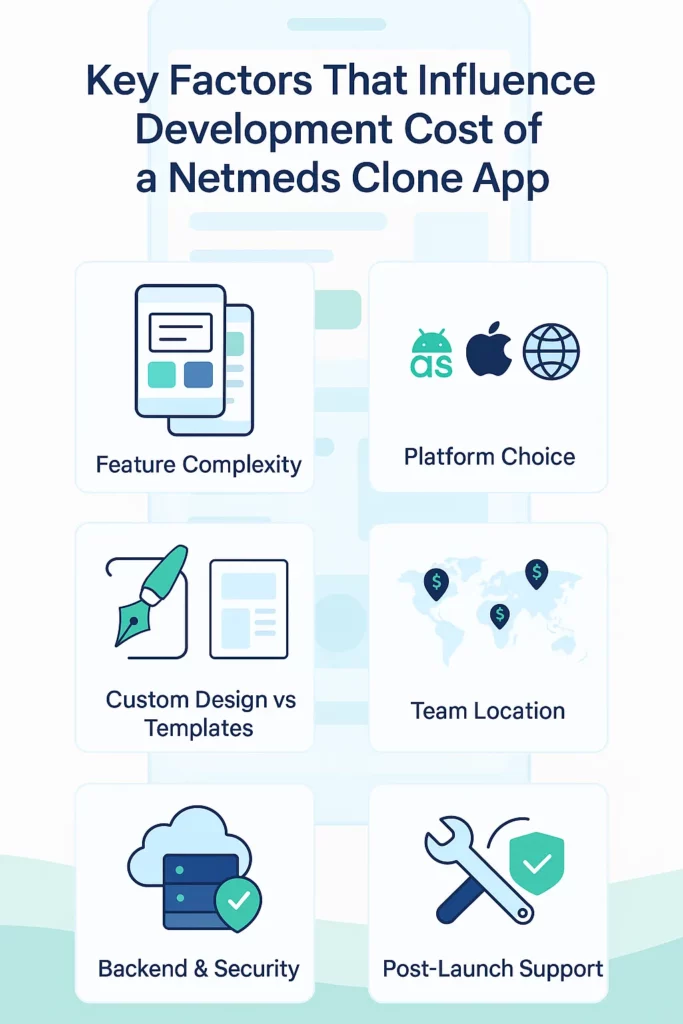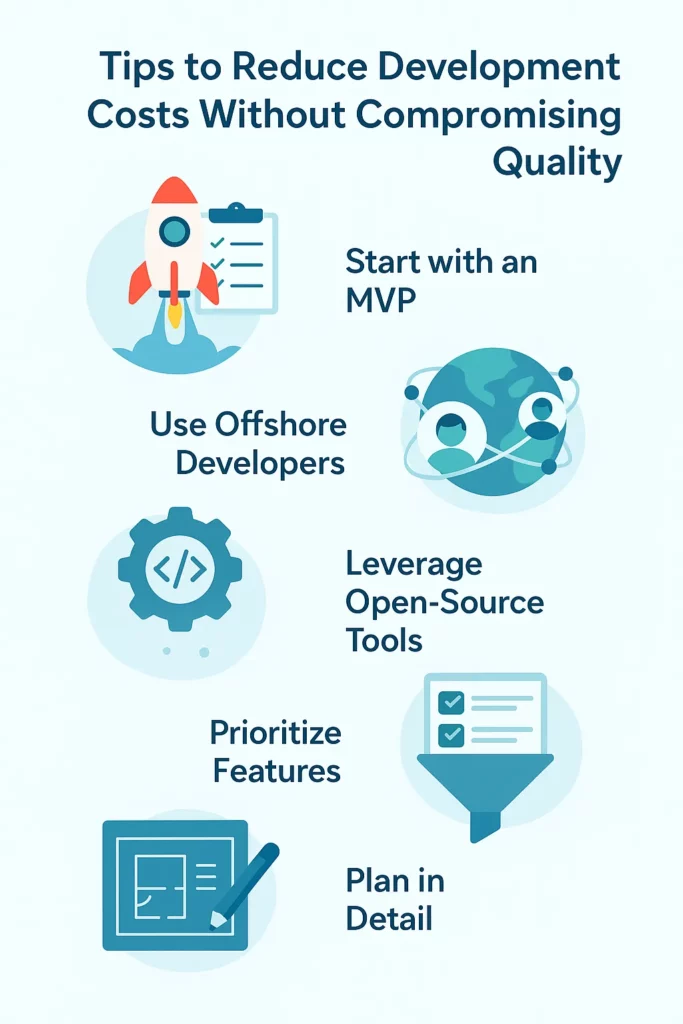Cost to Build an Online Pharmacy Like Netmeds App
Create a powerful, customizable online pharmacy solution with Miracuves’ Netmeds, equipped with high-performance features and next-gen technology.
When planning to launch an online pharmacy platform with the convenience of home delivery, one of the first questions you’re likely asking is: “What’s the development cost?”
The answer to that isn’t straightforward—your costs depend on factors like the features you want, platform scope, the timeline, and whether you’re building from scratch or customizing an existing solution.

Factors Influencing Development Cost for an Online Pharmacy Netmeds App
The development cost for an online pharmacy platform can vary greatly depending on multiple factors. From choosing the right features to the platform’s technical needs and team expertise, your total budget is shaped by many decisions. Below are the main cost influencers that can affect the price of building a platform like Netmeds:
Feature Complexity
The complexity of the features you choose will directly impact the cost. A basic online pharmacy app will include essential features like product listings, search filters, order management, and payment gateways. However, adding features such as personalized medicine recommendations, prescription uploads, automatic refills, or multi-language support will increase both the time and cost of development.
Number of Platforms
Are you developing for iOS, Android, or both? Do you need a web platform as well? Building for multiple platforms (mobile apps and web-based dashboards for admin and users) can increase development costs. Cross-platform development tools like React Native or Flutter can help reduce costs by allowing the same codebase to work across both iOS and Android.
UI/UX Design
The design of your app plays a significant role in the user experience and therefore, its success. A clean, intuitive design that allows customers to easily search, select, and purchase medicines is crucial. The more advanced the design (custom animations, detailed user flows, unique branding), the higher the cost. Simpler, template-based designs cost less but may not offer the same level of polish or customer engagement.
Development Team Location
The location of your development team impacts both the hourly rate and the overall cost. Rates differ significantly depending on the region:
North America: $100–$200/hr
Western Europe: $80–$150/hr
Eastern Europe: $40–$80/hr
India & Southeast Asia: $20–$50/hr
Backend Infrastructure
A robust backend infrastructure is essential to ensure seamless operations, especially for features like real-time order tracking, inventory management, and secure payment gateways. Cloud-based solutions (AWS, Firebase) and scalable databases will add to the backend development cost, but they are crucial for ensuring your platform performs reliably as it grows.
Post-Launch Support & Maintenance
The initial launch is only the beginning. Ongoing maintenance, feature updates, bug fixes, and server costs need to be accounted for in your budget. A good rule of thumb is to reserve 10–20% of your total build cost annually for maintenance and improvements.
Estimated Cost by App Type: Netmeds App Development
|
App Type
|
Estimated Cost Range (USD)
|
Description
|
|---|---|---|
|
MVP (Minimum Viable Product)
|
$8,000 – $15,000
|
Core features: login/signup, product catalog, search, cart, checkout, order tracking
|
|
Standard Version
|
$15,000 – $30,000
|
Add-ons: prescription upload, doctor chat, coupon system, CMS panel, analytics
|
|
Full-Featured App
|
$30,000 – $50,000+
|
Includes: AI-powered search, teleconsultation, delivery partner module, subscriptions, CRM integrations
|
Netmeds-Style Medicine Delivery App Development Cost by Miracuves (2026 Pricing)
|
App Type
|
Estimated Cost Range (USD)
|
Description
|
|---|---|---|
|
MVP (Minimum Viable Product)
|
$999 – $1,499
|
Core features: login/signup, medicine catalog, search, cart, basic checkout, prescription upload, simple order tracking.
|
|
Standard Version
|
$1,500 – $2,099
|
Adds doctor chat, improved prescription handling, coupon system, CMS panel, enhanced analytics, and better UI/UX.
|
|
Full-Featured App
|
$2,899 (Miracuves)
|
Advanced features: AI-powered search, full teleconsultation module, partner pharmacy management, subscriptions, AR pill identification, CRM integrations, and scalable delivery operations
|
Note:
Every Netmeds-style solution from Miracuves includes full source-code ownership, free 60-day post-launch support, and cloud deployment assistance for seamless scalability.
Delivery timeline: 3–9 days for the full-featured ready-made solution.
Launch your Netmeds-Style Medicine Delivery App with Miracuves — built for reliability, security, and healthcare compliance.
Region-Wise Development Cost Comparison
|
Region
|
Hourly Rate (USD)
|
Typical Cost for Standard App
|
|---|---|---|
|
North America
|
$100 – $200/hr
|
$100,000 – $200,000+
|
|
Western Europe
|
$80 – $150/hr
|
$80,000 – $160,000+
|
|
Eastern Europe
|
$40 – $80/hr
|
$40,000 – $90,000+
|
|
India & Southeast Asia
|
$20 – $50/hr
|
$20,000 – $60,000+
|
Why Offshore Teams Are a Smart Choice
Partnering with teams in India, Vietnam, or the Philippines gives you:
Up to 70% cost savings compared to US-based agencies
High-quality code and design standards
Access to larger talent pools
Teams experienced in eCommerce, healthcare, and logistics domains
Cost Breakdown by Development Stage
Understanding where your budget is being allocated throughout the development process can help you plan better and avoid unexpected costs. Below is a typical cost distribution for building an online pharmacy Netmeds app, broken down by development stages:
|
Development Stage
|
Estimated % of Total Cost
|
Includes
|
|---|---|---|
|
Discovery & Planning
|
5–10%
|
Market research, competitor analysis, defining user personas, feature scoping, technical requirements.
|
|
UI/UX Design
|
10–15%
|
Wireframing, prototyping, responsive design, visual branding, user experience mapping.
|
|
Frontend & Backend Dev
|
40–50%
|
Core feature development, database architecture, APIs, payment integrations, dashboard and logic build.
|
|
Testing & QA
|
10–15%
|
Manual and automated testing, bug fixing, device/browser compatibility checks, performance tuning.
|
|
Deployment & Launch
|
5–10%
|
App store submission (Android/iOS), server setup, production deployment, performance monitoring tools.
|
|
Maintenance & Updates
|
10–20%
|
Post-launch bug fixes, new features, server maintenance, user support, compliance updates.
|

Tips to Reduce Development Costs Without Compromising Quality
Building a reliable and scalable online pharmacy platform doesn’t have to come with a hefty price tag. Here are some founder-friendly strategies that can help you cut costs strategically while still delivering a high-quality app.
1. Start with an MVP
Instead of building every feature you think your app might need, focus on the essentials for an MVP (Minimum Viable Product). Prioritize core functionalities like product search, payment processing, order management, and user registration. This approach allows you to validate your idea with real users and gather feedback, so you can build more effectively in future iterations.
2. Partner with Offshore Experts
Choosing to work with an offshore development team can significantly reduce your development costs. Teams based in countries like India or Southeast Asia offer experienced developers at a fraction of the cost of North American or Western European teams. The key is to find a trusted partner who understands the complexities of building an online pharmacy platform.
3. Leverage Open-Source & Ready-Made Tools
Why reinvent the wheel when there are countless open-source tools and ready-made SDKs (Software Development Kits) available? Using existing solutions for common features like payment gateways, messaging, and mapping can save you time and money.
4. Prioritize High-Impact Features
Focus on features that directly impact user acquisition, retention, and satisfaction. Features like prescription uploads, personalized product recommendations, and secure payment processing are essential for your platform’s success.
5. Plan Everything Before You Build
Clear planning at the beginning of the project can save you both time and money. Define your app’s scope, create wireframes, and outline the features before development begins. This way, you’ll avoid mid-project changes, which are a major source of budget overruns.
Choose the Right Development Partner
Building an online pharmacy platform isn’t just a technical challenge—it’s a strategic business decision. The development partner you choose will play a crucial role in the success of your project. Here’s what you should look for in a team that can help you launch and scale your platform effectively:
1. App Development Expertise
Generic app development teams might not fully understand the specific needs of an online pharmacy platform. You need a team that has experience building healthcare-related platforms and understands the complex features that are unique to this industry—such as prescription management, secure payment systems, and integration with healthcare databases.
2. Scalable Architecture
Your platform may begin by serving a small group of users in a single region, but what happens when you want to scale? You need a development partner who can build your platform with a modular, scalable architecture.
3. Fast, Reliable Delivery
As a startup, time is of the essence. You can’t afford to wait months for your app to launch. A development team with experience in building online pharmacy platforms should be able to deliver results quickly while maintaining quality.
4. End-to-End Support
Development doesn’t end once your app is launched. You’ll need ongoing support for bug fixes, feature updates, server management, and data analytics. Your development partner should offer end-to-end support to help you optimize the platform post-launch. This includes making improvements based on user feedback, scaling the app for new markets, and ensuring the platform remains secure and compliant with regulations.
Conclusion
Understanding the costs associated with building an online pharmacy platform is essential for making smart, informed decisions as you move forward with your project. While the development process can be complex and costly, you have several opportunities to reduce your budget without sacrificing quality or user experience.
At Miracuves, we specialize in building customizable, high-quality online pharmacy solutions that are secure, scalable, and designed to meet the specific needs of your business. Whether you’re starting with an MVP or aiming for a full-featured platform, we help you bring your vision to life quickly and efficiently.
Ready to bring your online pharmacy platform to market? Explore our Online Pharmacy App Development page or get in touch with our team for a personalized cost estimate and roadmap tailored to your needs.
Let’s get started on your journey to building a successful, scalable online pharmacy!
Frequently Asked Questions
For an online pharmacy platform, the essential features include product search, user registration, secure payment processing, prescription uploads, order management, and delivery tracking. These features allow you to provide the basic functionality needed to operate an efficient and secure online pharmacy. Additional features such as AI-powered product recommendations, personalized medicine reminders, and multi-language support can be added as the platform scales.
The development duration for an online pharmacy app typically ranges from 2 to 12 months depending on features, integrations, and complexity. However, Miracuves provides a ready-made pharmacy app solution that can be deployed in just 3–9 days, enabling rapid launch and real user onboarding without long development delays.
Security is crucial in the healthcare industry. To ensure the safety of user data and payment information, make sure your app complies with data protection regulations like HIPAA (for U.S.-based platforms) and GDPR (for European platforms). Additionally, using secure payment gateways, encryption for sensitive information, two-factor authentication, and regular security audits can help protect your platform from potential vulnerabilities.
Yes, starting with an MVP is a smart strategy for testing your concept without over-investing upfront. By focusing on core features like product search, ordering, and payment processing, you can validate your business idea and gather real user feedback. Once you have traction and understand your users’ needs, you can scale up the platform by adding advanced features like AI recommendations, loyalty programs, and more.
Ongoing maintenance costs typically range from 10–20% of the initial development cost annually. These costs include server maintenance, bug fixes, updates, security patches, and adding new features based on user feedback. Regular updates and maintenance are crucial for keeping the platform secure and ensuring a seamless user experience as the app evolves.



